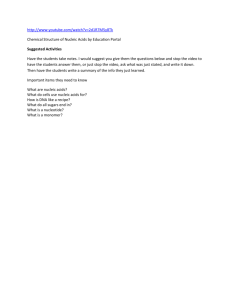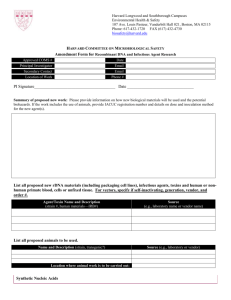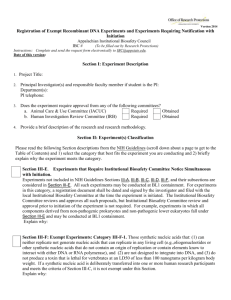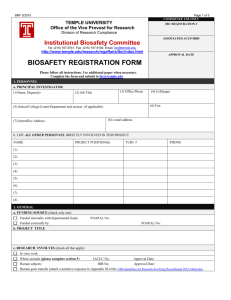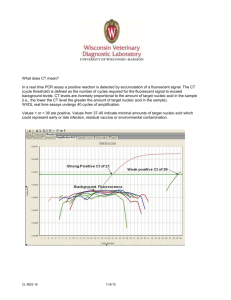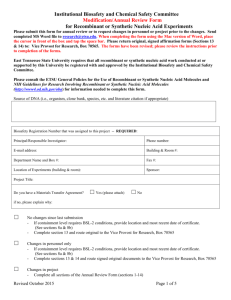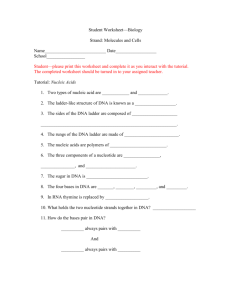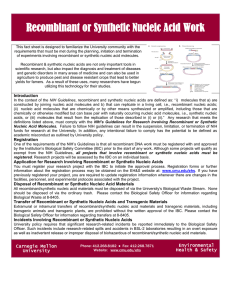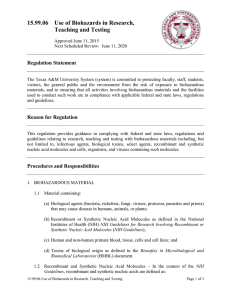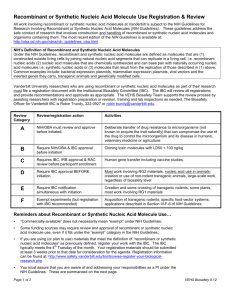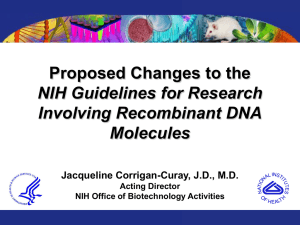Exemption Recombinant/Synthetic Nucleic Acid Molecules
advertisement
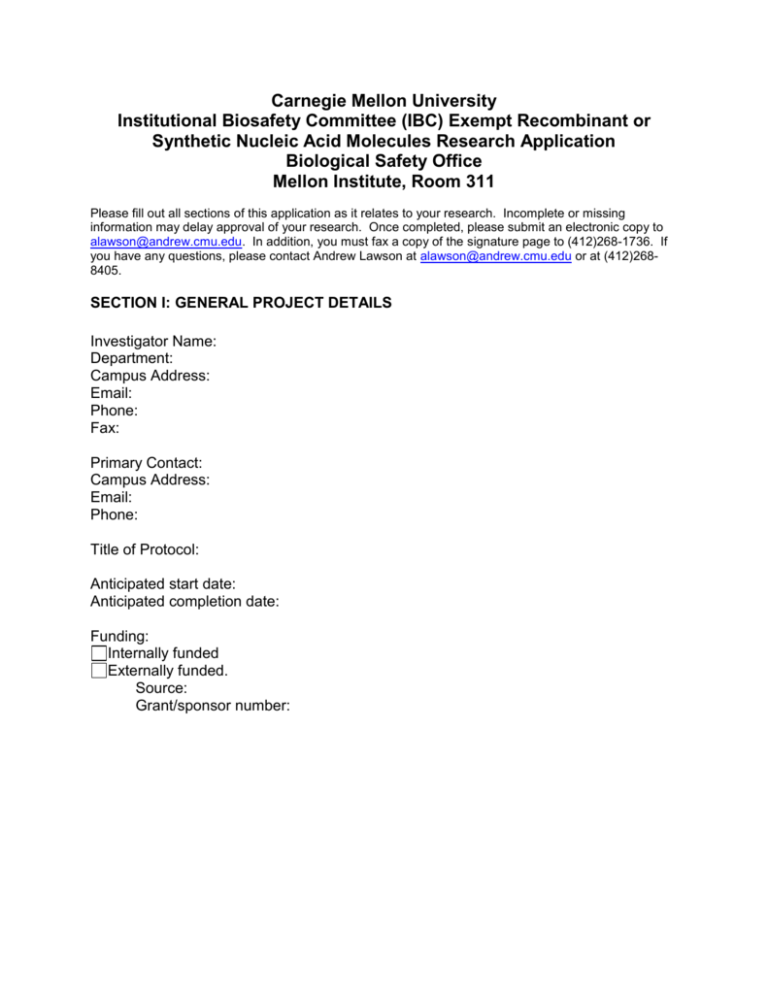
Carnegie Mellon University Institutional Biosafety Committee (IBC) Exempt Recombinant or Synthetic Nucleic Acid Molecules Research Application Biological Safety Office Mellon Institute, Room 311 Please fill out all sections of this application as it relates to your research. Incomplete or missing information may delay approval of your research. Once completed, please submit an electronic copy to alawson@andrew.cmu.edu. In addition, you must fax a copy of the signature page to (412)268-1736. If you have any questions, please contact Andrew Lawson at alawson@andrew.cmu.edu or at (412)2688405. SECTION I: GENERAL PROJECT DETAILS Investigator Name: Department: Campus Address: Email: Phone: Fax: Primary Contact: Campus Address: Email: Phone: Title of Protocol: Anticipated start date: Anticipated completion date: Funding: Internally funded Externally funded. Source: Grant/sponsor number: SECTION II: EXPERIMENT CATEGORY Please choose the appropriate section(s) of the NIH Guidelines under which your research falls (check all that apply): Section III-F. Exempt Experiments Section III-F-1. Those synthetic nucleic acids that: (1) can neither replicate nor generate nucleic acids that can replicate in any living cell (e.g., oligonucleotides or other synthetic nucleic acids that do not contain an origin of replication or contain elements known to interact with either DNA or RNA polymerase), and (2) are not designed to integrate into DNA, and (3) do not produce a toxin that is lethal for vertebrates at an LD50 of less than 100 nanograms per kilogram body weight. If a synthetic nucleic acid is deliberately transferred into one or more human research participants and meets the criteria of Section III-C, it is not exempt under this Section. Section III-F-2. Those that are not in organisms, cells, or viruses and that have not been modified or manipulated (e.g., encapsulated into synthetic or natural vehicles) to render them capable of penetrating cellular membranes. Section III-F-3. Those that consist solely of the exact recombinant or synthetic nucleic acid sequence from a single source that exists contemporaneously in nature. Section III-F-4. Those that consist entirely of nucleic acids from a prokaryotic host, including its indigenous plasmids or viruses when propagated only in that host (or a closely related strain of the same species), or when transferred to another host by well-established physiological means. Section III-F-5. Those that consist entirely of nucleic acids from a eukaryotic host including its chloroplasts, mitochondria, or plasmids (but excluding viruses) when propagated only in that host (or a closely related strain of the same species). Section III-F-6. Those that consist entirely of DNA segments from different species that exchange DNA by known physiological processes, though one or more of the segments may be a synthetic equivalent. A list of such exchangers will be prepared and periodically revised by the NIH Director with advice of the RAC after appropriate notice and opportunity for public comment (see Section IVC-1-b-(1)-(c), Major Actions). See Appendices A-I through A-VI, Exemptions under Section III-F-6--Sublists of Natural Exchangers, for a list of natural exchangers that are exempt from the NIH Guidelines. Section III-F-7. Those genomic DNA molecules that have acquired a transposable element, provided the transposable element does not contain any recombinant and/or synthetic DNA. Section III-F-8. Those that do not present a significant risk to health or the environment (see Section IV-C-1-b-(1)-(c), Major Actions), as determined by the NIH Director, with the advice of the RAC, and following appropriate notice and opportunity for public comment. See Appendix C, Exemptions under Section IIIF-8 for other classes of experiments which are exempt from the NIH Guidelines. SECTION III: EXEMPTION JUSTIFICATION Briefly explain why you believe your project falls within the above checked exempt category: SECTION IV: ASSURANCE INFORMATION a. I certify that the information provided in this application is complete, accurate and consistent with any proposal(s) submitted to a funding agency. b. I agree that I will not begin this project until receipt of official approval from the appropriate committee(s). c. I agree that modification to the originally approved project will not take place without prior review and approval by the appropriate committee(s), and that all activities will be performed in accordance with all applicable federal, state, local and University policies. d. I will follow applicable biosafety level requirements, comply with all shipping requirements and required waste management practices. e. I will ensure that all personnel have appropriate training including but not limited to: biosafety principles and techniques, hazard identification, management of accidental spills, shipping regulations, proper handling of biohazardous materials and waste management. f. I am aware that the IBC reserves the right to conduct inspections of the research facilities at any time. g. I have read and understood the document, “Principal Investigator Responsibilities Under the NIH Guidelines.” h. The electronic submission and acceptance of this document at the Biosafety Office is agreement with the statements a-g (above) Signature of Principal Investigator Date
